Filter by

Strengthening European Climate Policy = Governance Recommendations from Innov…
This open-access book foregrounds 10 novel collaborations between the Social Sciences and Humanities (SSH), and Science, Technology, Engineering and Mathematics (STEM) disciplines, for strengthening European climate policy. Part of a three-volume collection covering climate, energy, and mobility policy.
- Edition
- 1
- ISBN/ISSN
- 9783031720550
- Collation
- XXXV, 163 hlm; ill., lamp.,
- Series Title
- -
- Call Number
- -

Akzeptanzkommunikation in der Energie- und Rohstoffwirtschaft
Diese Open-Access-Publikation untersucht die Akzeptanz der sächsischen Bevölkerung gegenüber Energie- und Rohstoffvorhaben sowie die Eignung von Kommunikationsmaßnahmen zur Verbesserung des Akzeptanzniveaus. Die Bürger:innen werden erstmals repräsentativ zu ihrer (In-)Akzeptanz gegenüber Anlagearten befragt. Dabei wird nachgewiesen, dass die Akzeptanz bei lokalen Projekten immer geringer…
- Edition
- 1
- ISBN/ISSN
- 978-3-658-40798-8
- Collation
- XXVII, 237
- Series Title
- -
- Call Number
- -
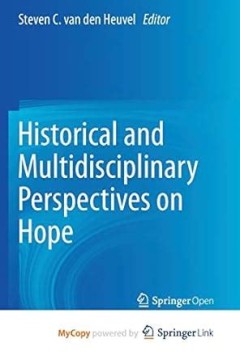
Historical and Multidisciplinary Perspectives on Hope
This open access volume makes an important contribution to the ongoing research on hope theory by combining insights from both its long history and its increasing multi-disciplinarity. In the first part, it recognizes the importance of the centuries-old reflection on hope by offering historical perspectives and tracing it back to ancient Greek philosophy. At the same time, it provides novel per…
- Edition
- 1
- ISBN/ISSN
- 9783030464899
- Collation
- XVI, 263 hlm; ill., lamp.,
- Series Title
- -
- Call Number
- -
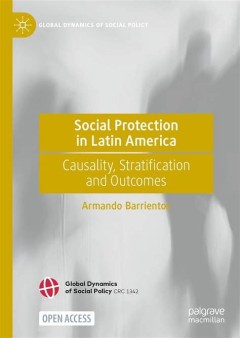
Social Protection in Latin America = Causality, Stratification and Outcomes
This book offers a comprehensive analysis of social protection in Latin America, its origins, institutions, and outcomes. The chapters are organised in three groups. The earlier chapters discuss in turn appropriate methods, an analytical framework, and core institutions. The book advocates a causal inference approach to the study of the institutions that have dominated social protection in t…
- Edition
- 1
- ISBN/ISSN
- 9783031497957
- Collation
- XIX, 293 ill; lamp
- Series Title
- -
- Call Number
- -
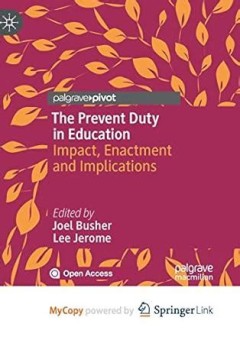
The Prevent Duty in Education = Impact, Enactment and Implications
This open access book explores the enactment, impact and implications of the Prevent Duty across a range of educational contexts. In July 2015 the UK became the first country to place a specific legal requirement on those working in education to contribute to efforts to ‘prevent people from being drawn into terrorism’. Drawing on extensive research with staff, children and young people, the…
- Edition
- 1
- ISBN/ISSN
- 9783030455590
- Collation
- X, 176 hlm; ill., lamp.,
- Series Title
- -
- Call Number
- -

Akademische Subjektivierung im Dispositiv neoliberaler Gouvernementalität
In diesem Open-Access Buch wird die Transformation von traditionellen zu unternehmerischen Hochschulen unter einer neoliberalen Wissens- und Identitätspolitik untersucht. Vor dem Hintergrund einer Ökonomisierung der Gesellschaft geraten deutsche Hochschulen und ihre Angehörigen ab den 1990er Jahren zunehmend unter Druck, sich unternehmerisch-manageriale Denk- und Handlungsweisen anzueignen, …
- Edition
- 1
- ISBN/ISSN
- 9783658427474
- Collation
- XV, 351 hlm; ill., lamp.,
- Series Title
- -
- Call Number
- -

Extended Working Life Policies = International Gender and Health Perspectives
This open access book addresses the current debate on extended working life policy by considering the influence of gender and health on the experiences of older workers. Bringing together an international team of scholars, it tackles issues as gender, health status and job/ occupational characteristics that structure the capacity and outcomes associated with working longer. The volume starts wi…
- Edition
- 1
- ISBN/ISSN
- 9783030409852
- Collation
- XXIV, 515 hlm; ill., lamp.,
- Series Title
- -
- Call Number
- -

Trade Union Cooperation in Europe = Patterns, Conditions, Issues
This open access book discusses transnational trade union cooperation in Europe – its forms, focuses, conditions, and obstacles. It provides an overview of existing trade union cooperation and includes detailed analyses of two specific questions: the debates on statutory minimum wages and the Posting of Workers Directive. Drawing on empirical research, the authors take a comparative approach,…
- Edition
- 1
- ISBN/ISSN
- 9783030387709
- Collation
- XIV, 157 hlm; ill., lamp.,
- Series Title
- -
- Call Number
- -
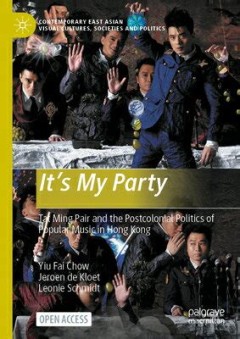
It’s My Party = Tat Ming Pair and the Postcolonial Politics of Popular Musi…
This book is unique in focusing on just one band from one city – but the story of Tat Ming Pair, in so many ways, is the story of Hong Kong's recent decades, from the Handover to the Umbrella Movement to 2019's standoff. A comprehensive, theoretically informed study of the sonic history and present of Hong Kong through the prism of Tat Ming Pair, this book will be of interest to cultural stu…
- Edition
- 1
- ISBN/ISSN
- 9789819967100
- Collation
- XXIV, 230 hlm; ill., lamp.,
- Series Title
- -
- Call Number
- -
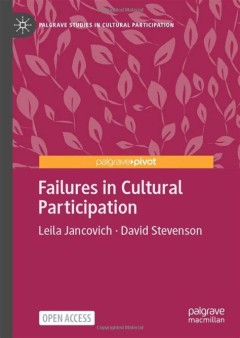
Failures in Cultural Participation
This open access book examines how and why the UK's approach towards increasing cultural participation has largely failed to address inequality and inequity in the subsidised cultural sector despite long-standing international policy discourse on this issue. It further examines why meaningful change in cultural policy has not been more forthcoming in the face of this apparent failure. This work…
- Edition
- 1
- ISBN/ISSN
- 9783031161162
- Collation
- XV, 162 ill; lamp
- Series Title
- -
- Call Number
- -
 Computer Science, Information & General Works
Computer Science, Information & General Works  Philosophy & Psychology
Philosophy & Psychology  Religion
Religion  Social Sciences
Social Sciences  Language
Language  Pure Science
Pure Science  Applied Sciences
Applied Sciences  Art & Recreation
Art & Recreation  Literature
Literature  History & Geography
History & Geography